#eBook Library Software
Explore tagged Tumblr posts
Text
Potential of eBook Library Software
Welcome to our podcast, where we dive into the ever-evolving realm of eBooks and their profound influence on contemporary education. Recent worldwide data indicates a significant rise in readers adopting digital formats, allowing them to access beloved titles effortlessly across a multitude of devices. Explore more about eBook library software at https://mintbookonline.wordpress.com/2024/04/10/ebook-library-software/.
0 notes
Text
My reading stats from 2022:
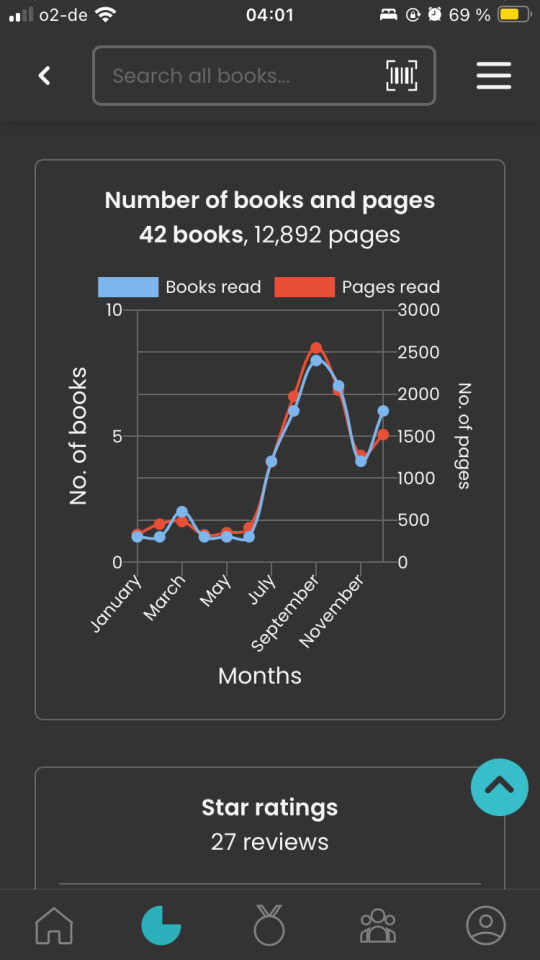
Take a guess where I went in July and who finally got their library card.
physically go to your local library at least once. seriously.
look around. find a random book with a cover that catches your attention. read the description. read the first page. if you like the sounds of it, borrow it and take it home to read. borrow a handful of books even.
if a book loses your interest, drop it. if a book grips onto you, ride that wave.
i've struggled to read recreationally for years despite having read so much as a kid. a lot of us are frozen by the seemingly infinite choices. even when we buy books to take home, we don't read them because which book is worth reading first? we don't have to decide, we have it right here in our bookshelves, we have an eternity of never deciding.
in this past month, i have read five books, most of them i've never heard of when i spotted their cover at the library. most of them, i've ended up loving. the due date of library books maintains the ability to read a book so i can return them to the library and leave the library with more books. an even better incentive than borrowing ebooks, because i actually have to leave the house and not be a hermit.
so if you used to enjoy reading but struggle with it now, ignore the book recs you hear. go to the library, come across a book that piques your interest, and read one page after another until you either lose interest or finish the book.
then it's onto the next one.
#before that I struggled to read a book a month#but now I have all the possibilities#a also started buying new books but most are borrowed#there is another spike in 23 when I got a new ebook reader and could use Libby again#my old Sony reader was a decade old at this point and all the software slowly stopped working#I had to use three different programs to get the library book from my PC to the reader#and then this stopped working#the English selection is better online but I like to go outside once in awhile#my local library is awesome#I can even borrow power tools or a whole telescope#library#libraries
6K notes
·
View notes
Text
Internet Archive is a valuable resource and library for many old and neglected pieces of media, including long out of print books. Seeing this court ruling saddens me, I hope the site will continue to be okay despite this. You can donate to help the internet archive here:
https://archive.org/donate?origin=iawww-TopNavDonateButton
#internet archive#library#online library#ebooks#pdfs#media preservation#music#movies#tv#books#history#history preservation#games#mods#art#software#web sites#old web sites
0 notes
Text
Amazon’s recent decision to stop allowing people to download copies of their Kindle e-books to a computer has vindicated some of my longstanding beliefs about digital media. Specifically, that it doesn’t exist and you don’t own it unless you can copy and access it without being connected to the internet. The recent move by the megacorp and its shiny-headed billionaire CEO Jeff Bezos is another large brick in the digital wall that tech companies have been building for years to separate consumers from the things they buy—or from their perspective, obtain “licenses” to. Starting Wednesday, Kindle users will no longer be able to download purchased books to a computer, where they can more easily be freed of DRM restrictions and copied to e-reader devices via USB. You can still send ebooks to other devices over WiFi for now, but the message the company is sending is one tech companies have been telegraphing for years: You don’t “own” anything digital, even if you paid us for it. The Kindle terms of service now say this, explicitly. “Kindle Content is licensed, not sold, to you,” meaning you don’t “buy a book,” you obtain a “digital content license.”
[...]
Amazon is far from alone in this long-running trend towards eliminating digital ownership. For many people, digital distribution and streaming services have already practically ended the concept of owning and controlling your own media files. Spotify is now almost synonymous with music for some younger generations, having strip-mined the music industry from both ends by demonetizing more than 60% of the artists on its platform and pushing algorithmic slop while simultaneously raising subscription fees. Of course, surrendering this control means being at the complete mercy of Amazon and other platforms to determine what we can watch, read, and listen to—and we’ve already seen that these services frequently remove content for all sorts of reasons. Last October, one year after the Israeli military began its campaign of genocide in Gaza, Netflix removed “Palestinian Stories,” a collection of 19 films featuring Palestinian filmmakers and characters, saying it declined to renew its distribution license. Amazon also once famously deleted copies of 1984 off of people’s Kindles. Fearing piracy, many software companies have moved from the days of “Don’t Copy That Floppy” to the cloud-based software-as-a-service model, which requires an internet connection and charges users monthly subscription fees to use apps like Photoshop. No matter how you look at it, digital platforms have put us on a path to losing control of any media that we can’t physically touch. How did we get here?
28 February 2025
140 notes
·
View notes
Text
So, in the midst of... you know, everything, life at the library goes on and I wanted to talk about the difference between Libby and Hoopla.
For those not in the know, Libby and Hoopla are both apps/software that libraries can use to offer digital items to our patrons. Libby does ebooks (including graphic novels) and audiobooks.

Hoopla does ebooks, audiobooks, digital comics (weekly issues, not just trades or graphic novels), movies, TV shows, and music.

A little while back, my library system had to cut down on the number of Hoopla items patrons can check out per month. This caused a little bit of a stir - people like Hoopla! And they should! It's really cool! But the reason we had to cut back there and not with Libby was because the ways we pay for Libby and Hoopla are different.
Libby uses a pay-per-license model. This means that when we buy an ebook or audiobook on Libby, it's like we're buying one copy of a physical item. Except, because publishers are vultures, it's often much more expensive than buying one copy of the physical book - unless it's an audiobook, in which case buying the CDs might very well be more expensive than buying the digital license on Libby. That's why you might have to wait on a list for a Libby title that's really popular: we only have licenses for so many "copies". These licenses can be in perpetuity (i.e. you pay once and you can use that copy forever) or, more commonly, for a limited length of time like a year. Once that time is up, we decide whether to pay for the license for each copy again.
Hoopla uses a pay-per-circulation model. There's no waiting: once you, the patron, decide you'd like to check something out, you can do so immediately and we pay Hoopla a smaller amount of money to essentially "rent" the license from them. Cool, right?
Except that the pay-per-circ model adds up. If we have access to a brand new or popular title on Libby and Hoopla, and the Libby copy has a long waiting list, patrons might hop over to Hoopla to check it out immediately. If enough people do this, we might end up paying more overall for the Hoopla item on a per-circulation basis than we did for the license on the Libby item. That's why libraries typically limit the number of Hoopla checkouts patrons can use per month: because otherwise, we can't predict the amount we'll be paying Hoopla in the same way we can predict the amount we'll pay Libby.
Let me be clear: If a library offers a digital service and it would be helpful to you, please use it. Don't deny yourself a service you need or would enjoy in some misguided attempt to save your library some cash. We want to offer digital services, not least because ebooks and audiobooks have accessibility features that print books often don't. If your library has Libby and Hoopla and you get utility out of both, use both!
That said, if you're upset with the lower number of checkouts on Hoopla or the limited number of titles or copies available to you on Libby, you know who you should talk to? Your elected officials. Local, state, and federal. Because those folks are the ones who decide how much money we get, and what we can spend it on.
Don't go to them angry, either, because then we'll get scolded for not using the funds they "gave" us appropriately. (If you're a frequent library user, you might be shocked at how anti-library many local government officials already are.) Write your officials an email, call them, or show up at a board meeting and say you like the services the library offers, but you'd love it if we had enough money to buy more books on Libby or offer more checkouts on Hoopla. Tell them directly that this is how you would like your tax dollars to be spent.
If anybody has questions about how Hoopla or Libby work, I'm happy to answer them! Just wanted to make sure we had a baseline understanding.
#books & libraries#librarians of tumblr#bookblr#booklr#reading#public libraries#librarians#hoopla#libby
184 notes
·
View notes
Text
As we learn about in The Enemies of Books by William Blades (which is in Gutenberg's public domain book collection because it was published in 1888), there are many ways that books can be lost to history, some of which are water, fire, and bans. The loss of destroyed libraries such as that of Alexandria are losses to all the world forever. We historians and archivists are grateful to discover any surviving copies that people secretly kept, and have no complaint if the means for that was piracy at the time, as likely it must be when a book has become illegal.
Here are some resources for the type of ebook archival projects described above:
Calibre is the free software mentioned above for organizing your collection of ebooks. Calibre's web site has a forum where you can ask questions.
Instructions for how to use a third-party plugin for Calibre to remove Digital Rights Management (DRM) from an ebook so that you can keep your own copy of it and archive it how you want.
The Trans Literature Preservation Project: A Practical Guide to Resisting Censorship. Books and media on certain topics could soon become illegal in the US. This is a guide on how to save, archive, and share those books.
The DataHoarders subreddit (and the new spin-off Dreamwidth community) are for asking questions of very experienced digital archivists. They can help with troubleshooting or figuring out how to do your archival projects.
"you should use your libby for ebooks" "you shouldn't pirate your ebooks" BITCH you can do both.
Simply borrow the ebook from libby, download it as a .ascm (drm epub thing) on your computer, then run the .ascm file through a drm remover of your choice (third-party plugins in Calibre is what to do). you can then keep the drm-free .epub and return the libby loan. Boom.
Win/win/win.
You get to keep the ebook (ALSO libby usually has high-quality files. so it's better than piracy).
You're borrowing the book from the library. They get their numbers up, you're supporting the author and your library.
You're not holding up the line.
#books#library#ebooks#rated G#archiving#queue#history#preservation#archival work#book bans#book banning#banned books#DataHoarders#Calibre#public domain#Gutenberg#book burning#censorship#DreamWidth#reddit#software
6K notes
·
View notes
Note
i just got my library card renewed after a very long time - do you know what all i can do with it other than taking out books? because i know there's more things but i feel like it's a silly question to ask
Not at all, and welcome back to the library life! Your millage may vary based on which of these services your library has available, but here's a few things I know of off the top of my head that are pretty common:
The library might have CDs, movies, and even newspapers you can borrow as well
Libby, an app that uses your library card to borrow and download ebooks and audiobooks to enjoy on your mobile device or e-reader
Kanopy, a streaming service for TV shows and movies
Hoopla, which has a whole bunch of stuff like shows & movies, comics, and magazines
Your library might have a makerspace that gives you access to things like 3D printers, button makers, computers with a bunch of Adobe software, ect
Sometimes they host book clubs or other fun community events!
my "#library guides" tag also has a number of posts about services like these if you'd like some more info. Your library's website should also list what services they offer, and/or you could ask a librarian there. Have fun!
#library guides#last week i renewed a card at a library i hadnt been to in years too :] it was nice to go there again#but then. then i FUCKING lost it i have no idea where the fuck it went#they gave me TWO they gave me a card card and a little one for a keychain and theyre BOTH missing what the FUCK. send me finding them energ#Edit lmao i found them in my car like 20 minutes after scheduling this post peace and love on earth
366 notes
·
View notes
Text
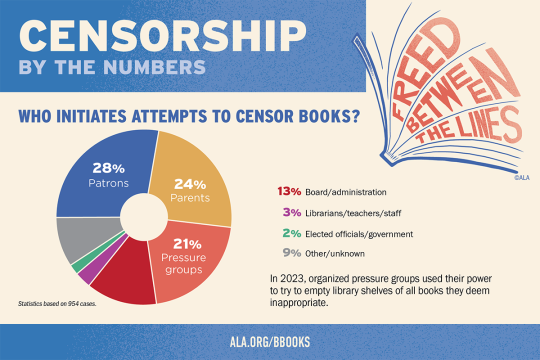


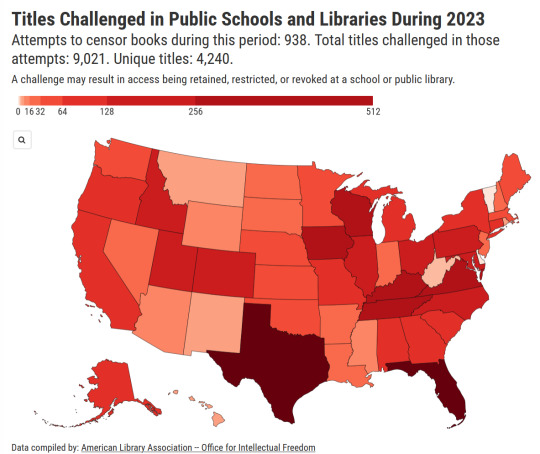
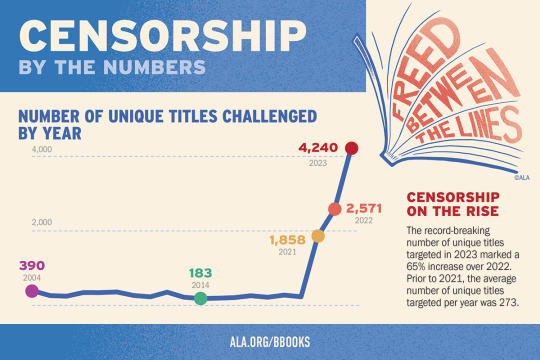
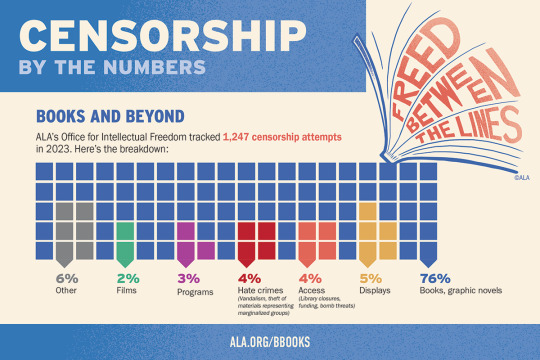
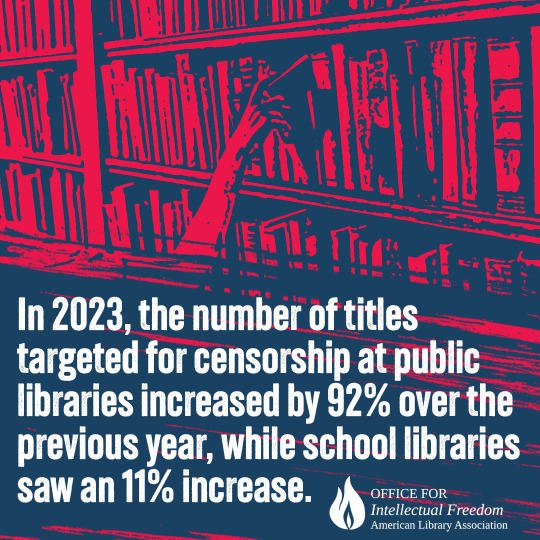
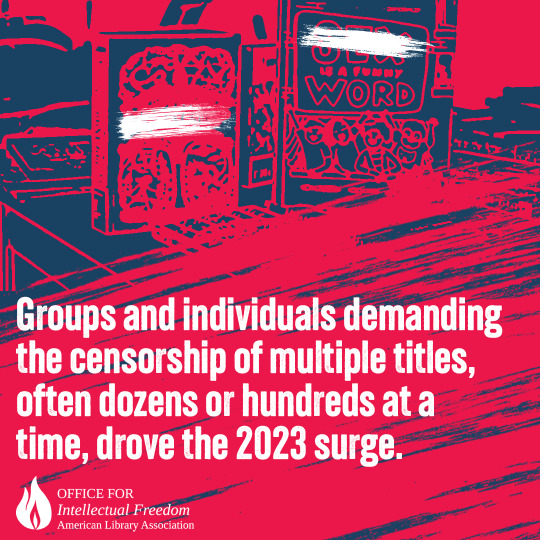
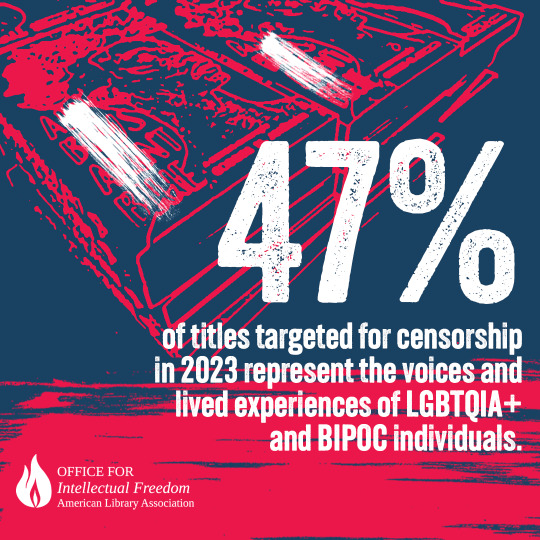
The ALA's State of America's Libraries Report for 2024 is out now.
2023 had the highest number of challenged book titles ever documented by the ALA.
You can view the full PDF of the report here. Book ban/challenge data broken down by state can be found here.
If you can, try to keep an eye on your local libraries, especially school and public libraries. If book/program challenges or attacks on library staff are happening in your area, make your voice heard -- show up at school board meetings, county commissioner meetings, town halls, etc. Counterprotest. Write messages of support on social media or in your local papers. Show support for staff in-person. Tell others about the value of libraries.
Get a library card if you haven't yet -- if you're not a regular user, chances are you might not know what all your library offers. I'm talking video games, makerspaces (3D printers, digital art software, recording equipment, VR, etc.), streaming services, meeting spaces, free demonstrations and programs (often with any necessary materials provided at no cost!), mobile WiFi hotspots, Library of Things collections, database subscriptions, genealogy resources, and so on. A lot of electronic resources like ebooks, databases, and streaming services you can access off-site as long as you have a (again: free!!!) library card. There may even be services like homebound delivery for people who can't physically come to the library.
Also try to stay up to date on pending legislation in your state -- right now there's a ton of proposed legislation that will harm libraries, but there are also bills that aim to protect libraries, librarians, teachers, and intellectual freedom. It's just as important to let your representatives know that you support pro-library/anti-censorship legislation as it is to let them know that you oppose anti-library/pro-censorship legislation.
Unfortunately, someone being a library user or seeing value in the work that libraries do does not guarantee that they will support libraries at the ballot. One of the biggest predictors for whether libraries stay funded is not the quantity or quality of the services, programs, and materials it offers, but voter support. Make sure your representatives and local politicians know your stance and that their actions toward libraries will affect your vote.
Here are some resources for staying updated:
If you're interested in library advocacy and staying up to date with the challenges libraries are facing in the U.S., check out EveryLibrary, which focuses on building voter support for libraries.
Book Riot has regular articles on censorship attempts taking place throughout the nation, which can be found here, as well as a Literary Activism Newsletter.
The American Library Association's Office for Intellectual Freedom focuses on the intellectual freedom component of the Library Bill of Rights, tracks censorship attempts throughout each year, and provides training, support, and education about intellectual freedom to library staff and the public.
The Electronic Frontier Foundation focuses on intellectual freedom in the digital world, including fighting online censorship and illegal surveillance.
I know this post is long, but please spread the word. Libraries need your support now more than ever.
163 notes
·
View notes
Text
so if any of y'all have ever purchased e-books from Amazon, then you should log in to your Amazon account, and under your Content Library, download all your e-books to your computer and transfer them to your kindle reader via USB, or send them directly to your preferred device (if you have more than one connected to your Amazon account) via wifi by clicking "Deliver or Remove from this device" and switching the device you want to send it to
Once you've downloaded all your purchased e-books, not ones that are borrowed from Kindle Unlimited or Prime Reading, download the free Calibre e-book management software and this DRM removal plugin to remove the DRM (digital rights management) from your e-books, which converts your kindle e-books into the universal e-book format EPUB or whatever other ebook format you'd like, bc the Kindle ebook format AZW and AZW3, can only be used on Kindle readers, but by removing the DRM, they can then be used on any device that reads the EPUB format
BUT why should you do all this? bc on Feb. 26, 2025 (one week from now as of the time I posted this) Amazon will no longer provide this download option bc they're aware that people have been downloading their e-books from their kindle libraries and using software like Calibre to convert those e-books into EPUBs and not have to be tied down to Amazon's ecosystem, which makes them lose money (boohoo), and also the switch towards cloud-based storage
Basically, any e-books you have purchased from Amazon are not yours to own, you're essentially being licensed the e-book, so they can use this loophole to alter or completely remove those e-books from the website at their whim, and you would no longer have access to those e-books, even though you legally purchased them, which is wild bc we should be able to legally own, forever, any digital media we buy and do what we want with it, and this is something that has been happening with other forms of digital media like movies and video games, where you "buy" a digital copy but you don't actually own it
You should also stop buying e-books from amazon from now on since you don't even own them, and cancel your Kindle Unlimited subscription if you have one, and you might as well download any audiobooks you've purchased on Audible (which is also owned by Amazon)
[watch this video and this video for more thorough explanations about this issue and this video for a tutorial on how to use Calibre and the DRM ]
Alternatives to kindle readers include: Kobo (has integration with Libby) and Nook (from Barnes & Noble), or sell or donate the one you have if you don't want to use it anymore
Alternatives to amazon e-books: Libby (free app that links to your local library if you have an active library card where you can borrow ebooks and other digital media), Internet Archive, Project Gutenburg, 🏴☠️ ebooks and PDFs, and research whether your favorite author has books available to purchase directly on their website
....and you can always purchase or borrow physical books and other media as well! support your local libraries and indie bookstores!
TL,DR: this is a matter of media ownership, censorship, and archiving, so download your Amazon e-books NOW before Amazon takes away your ability to access the items that you legally purchased and locks you down to using their devices and ecosystem
FEBRUARY 26 IS THE LAST DAY TO DOWNLOAD YOUR AMAZON EBOOKS
#amazon#kindle#ebooks#books#media ownership#idk what else to tag this but hopefully it can be seen by some people#if you would like to share this please do so bc this is time sensitive#just another reason to say FUCK YOU to amazon
37 notes
·
View notes
Text
Offline Library
In light of all the Ao3 issues lately I'm gonna throw this up as something people should consider doing. Make your own library of your favorite fics and any you might like to read in the future/are currently reading.
How do you do this? To start: Calibre & ReadEra app
Calibre is a free ebook management software, available on windows, mac, and linux - but also comes in a portable version you can put on a flash drive. Ebooks are very small files, 100s of fics can easily take less than 1GB of space. You can create categories for everything and all the tags on the fics will stay attached to them. You can download directly through ao3, or you can use the browser extension Ficlab which can make the process a little quicker, plus give you a book cover(or you can add your own cover). Epub or Mobi format is best.
ReadEra, is a free reading app with no ads that you can tell to only access a single file where you keep your ebooks. It's open source and the Privacy Statement and Terms & Conditions are very short and easy to read. You can transfer files from Calibre to your phone, but this is also a good option if you don't have a PC to use Calibre. You can make folders to organize all your fics.
Quality of life plugins for Calibre: Preferences > Plugins > Get New Plugins
Look up: EpubMerge, EpubSplit, FanFicFare, Generate Cover (restart calibre once you've added them all) Fun fact, with FanFicFare, you can download new chapters to update fics that are currently in progress directly in Calibre instead of having to open up ao3.
Also, to be clear - back them up for yourself only, don't you fucking dare repost them anywhere.
You can also backup Kindle books (and you should) with Calibre, though that's a bit more complicated; instructions under the read more
Firstly what is DRM? TLDR: digital rights management (DRM) is meant to prevent piracy, however, this also means you never really own your ebooks. If Amazon decides to take down a book you bought? That's it, it's gone and it doesn't matter that you paid for it.
Removing DRM If you're on PC and don't have a kindle device, you'll want kindle version 2.4.0 or it won't work in Calibre.
In Calibre, navigate to Preferences > Plugins > Load Plugin From File - DeDRM - Use the latest Beta or Alpha release, follow instructions on the github page
Preferences > Plugins > Get New Plugins
Look up: KFX Input
You'll have to restart Calibre once you install so just add them all at once before you restart it.
If you need some troubleshooting help setting anything up just ask and I'll try to help!
47 notes
·
View notes
Text
Streamlined Ebook Library Management Software
The worldwide statistics published suggest a steady increase in the number of readers who access books in electronic formats. Some of these readers access eBooks using desktops or laptops, while others find it convenient to read eBooks on smartphones or tablets.
Modern readers prefer eBooks to printed books due to their portable and convenient nature. Also, eBooks help readers protect the environment by eliminating paper usage. However, each reader wants to read his preferred eBook seamlessly using his preferred device.

As a widely used eLearning tool, eBook library software helps readers access the desired books in digital format using computers or mobile devices. In addition to being compatible with multiple devices and platforms, the digital library software enables users to read eBooks anytime and anywhere.
The cloud-based eBook library software comes with application programming interfaces (APIs). Enterprises and online education providers use these APIs to integrate the software seamlessly with learning management systems (LMS) and virtual classroom software. We can understand the importance of eBook library software by discussing some of its important use cases.
9 Important Use Cases of eBook Library Software
1. Support Self-Paced Learning
Many students join online courses to acquire knowledge despite their busy lifestyles. Likewise, working professionals join online courses to hone skills after working hours. Hence, they want options to access eLearning content anytime and anywhere.
Learners can access cloud-based eBook library software over the internet using computers or mobile devices. Also, they can read eBooks without downloading and installing the software on their devices. The on-demand access to eBooks makes it easier for organizations to adopt eLearning by supporting self-paced learning.
2. Improve Knowledge Acquisition and Retention
Multimedia content has changed the way modern learners acquire knowledge. Many learners these days prefer watching videos to reading eBooks while learning a new topic. Leading eBook library platforms enable learners to watch videos along with reading eBooks.
Additionally, they drive knowledge acquisition and retention by supporting quizzes, simulations, and journals. Also, a learner can use the software to gather additional information about a topic by accessing curated content gathered from external sources.
3. Simplify eBook Search
While taking online courses, learners gain in-depth understanding by accessing and reading a variety of content. The eBook library software enables them to understand a topic by reading eBooks or watching educational videos.
At the same time, the intuitive search interface provided by the software makes it easier for learners to find relevant eBooks in seconds. A learner also has the option to find relevant eBooks using multiple filters and criteria.
4. Increase Course Completion Rates
As highlighted by multiple studies, the completion rate of online courses is abysmally low. About 85% of learners abandon online courses due to several reasons. That is why; organizations focus extensively on boosting learner engagement and learning experiences while implementing eLearning.
Ebook library software boosts eLearning experiences by enabling learners to understand a topic in their preferred way. At the same time, the new-age digital library tools keep learners engaged using gamification features like coins and badges.
5. Automate Library Management
The management of traditional libraries is a time-intensive and cost-intensive process. Organizations have to deploy skilled librarians and implement library management systems to run conventional libraries efficiently.
However, eBook library solutions come with built-in library management tools. An administrator can use these intuitive tools to add, track, and update eBooks in minutes. Also, he is not required to track borrowed books as multiple learners can access a single eBook seamlessly and simultaneously.
6. Extend eLearning Tools
As mentioned earlier, cloud-based eBook library software comes with APIs. These APIs make it easier for organizations to integrate the edtech tool seamlessly with various eLearning tools and platforms. For instance, an organization can use APIs to integrate the digital library software with a learning management system or virtual classroom software. The integration boosts the functionality of eLearning tools by making eBooks accessible to learners.
7. Curtail eLearning Costs
While implementing eLearning, organizations spend a significant part of the budget on content creation. They have to deploy skilled content creators to produce eBooks on a wide range of topics and concepts. Many organizations these days reduce content creation time and costs by implementing eBook library software. The wide range of eBooks provided by the software helps them curtail eLearning costs significantly.
8. Become Sustainable
Sustainability is currently one of the hottest trends across industries. Every enterprise these days explores ways to impress customers and investors by becoming eco-friendly. Printed books make it challenging for companies to run employee training and development programs in a green environment. Enterprises replace printed books with eBooks to become sustainable by eliminating paper usage and waste. Many companies invest in eBook library software to become eco-friendly without escalating costs.
9. Preserve and Reuse Knowledge
In addition to providing access to a large repository of eBooks, digital library software allows organizations to upload and store existing eBooks. These options help organizations preserve knowledge for the future.
As an organization can reuse eBooks, it can keep the content accessible to learners over a longer period. Additionally, it can keep the knowledge base relevant by updating the eBooks regularly by updating statistics and data. Many organizations meet their long-term eLearning needs by investing in a reputable digital library platform.
Conclusion
As a prominent eLearning tool, eBook library software enables users to acquire knowledge and hone skills by accessing books in digital formats. A learner can read the desired eBook anytime and anywhere by accessing the software on his desktop, laptop, smartphone, or tablet.
At the same time, an enterprise or educational institution can integrate the digital library software with existing eLearning tools and solutions using APIs. However, organizations these days have the option to leverage eBook library software as part of unified learning platforms.
About Mintbook
Mintbook simplifies eLearning implementation by launching a unified learning platform. The platform supports blended learning models by featuring a LMS system and virtual classroom software. At the same time, it eliminates the need to create and manage eLearning content by providing robust eBook library software.
1 note
·
View note
Text

Great news everyone I am finally importing my RPG PDF collection into Calibre.
[ID: A screenshot of ebook library management software displaying thumbnails of two indie tabletop games (Lady Blackbird and Ten Candles) and soooooooo many AD&D Ravenloft adventure modules. Seriously why do I even have these. /ID]
22 notes
·
View notes
Text

If your library is shutting down, if your downloaded ebooks have vanished from your device, you can get books for free and you can fight back three FREE ways:
Libgen
Calibre
Gutenberg
Libgen allows you to download ebooks for free. The site moves regularly, last time I knew it was libgen.rs but it's here now:
Is that link now dead? Go to your search engine and enter the term LibGen. You'll find where it's moved to. Go there and download books. Save them to a backup. Burn a disk with them on it. Whatever you have to do to keep knowledge accessible to you and others.
In the novel Fahrenheit 451 by Ray Bradbury, books were banned but people assigned themselves a book and memorized it. Then shared the knowledge. We aren't there nor will we be because in Bradbury's time there wasn't the ability to download and save ebooks.
SO DOWNLOAD AND SAVE EBOOKS EXTERNALLY PLEASE.
Libgen helps you do that. So does Calibre, which is a free open-source ebook creator and an ebook reverser. You can take an epub or mobi and turn it into a PDF or a .docx.
Please do this if you fear knowledge will be lost. Or even if you don't. Just…save save save what you can because Amazon and all the other multi-nationals do not care nor will they care if knowledge goes away.
Finally Gutenberg.org is your one stop free source for books out of copyright. Download, download, download. They also have audiobooks.
Happy library building my friends.
(Library image: Wikimedia Commons)
52 notes
·
View notes
Text


Recently, I’ve spent some time consolidating my ebooks in Calibre (freeware ebook library management software). One of the things I had to import and organize was my archive of downloaded fanfiction (saved fics can be imported into Calibre as files or one can use plugin FanFicFare for it)
I wanted those files to have some nice looking book covers, so I’ve created a special AO3-edition of my book covers template. Those are to be used with “Generate Cover” plugin, that allows more control over the generated book cover, with an option to create your own design.
Download for free here + get instructions on installation and usage:
https://www.blog.private-universe.net/2025/03/03/calibre-book-cover-templates-ao3-edition/
I hope someone might get some usage of it too...
#Calibre#books#fanfiction#AO3#ao3 fanfic#archive of our own#book covers#ebooks#ebook#kindle#kobo#ereader#templates#my design
19 notes
·
View notes
Text
The Trump administration, working in coordination with Elon Musk’s so-called Department of Government Efficiency, has gutted a small federal agency that provides funding to libraries and museums nationwide. In communities across the US, the cuts threaten student field trips, classes for seniors, and access to popular digital services, such as the ebook app Libby.
On Monday, managers at the Institute of Museum and Library Services (IMLS) informed 77 employees—virtually the agency’s entire staff—that they were immediately being put on paid administrative leave, according to one of the workers, who sought anonymity out of fear of retaliation from Trump officials. Several other sources confirmed the move, which came after President Donald Trump appointed Keith Sonderling, the deputy secretary of labor, as the acting director of IMLS less than two weeks ago.
A representative for the American Federation of Government Employee Local 3403, a union that represents about 40 IMLS staffers, said Sonderling and a group of DOGE staffers met with IMLS leadership late last month. Afterwards, Sonderling sent an email to staff “emphasizing the importance of libraries and museums in cultivating the next generation’s perception of American exceptionalism and patriotism,” the union representative said in a statement to WIRED.
IMLS employees who showed up to work at the agency on Monday were asked to turn in their computers and lost access to their government email addresses before being ordered to head home for the day, the employee says. It’s unclear when, or if, staffers will ever return to work. “It’s heartbreaking on many levels,” the employee adds.
The White House and the Institute of Museum and Library Services did not immediately respond to requests for comment from WIRED.
The annual budget of IMLS amounts to less than $1 per person in the US. Overall, the agency awarded over $269.5 million to library and museum systems last year, according to its grants database. Much of that money is paid out as reimbursements over time, the current IMLS employee says, but now there is no one around to cut checks for funds that have already been allocated.
“The status of previously awarded grants is unclear. Without staff to administer the programs, it is likely that most grants will be terminated,” the American Federation of Government Employee Local 3403 union said in a statement.
About 65 percent of the funding had been allocated to different states, with each one scheduled to receive a minimum of roughly $1.2 million. Recipients can use the money for statewide initiatives or pass it on to local museum and library institutions for expenses such as staff training and back-office software. California and Texas have received the highest allocated funding, at about $12.5 million and $15.7 million, respectively, according to IMLS data. Individual libraries and museums also receive grants directly from IMLS for specific projects.
An art museum in Idaho expected to put $10,350 toward supporting student field trips, according to the IMLS grant database. A North Carolina museum was allotted $23,500 for weaving and fiber art workshops for seniors. And an indigenous community in California expected to put $10,000 toward purchasing books and electronic resources.
In past years, other Native American tribes have received IMLS grants to purchase access to apps such as Hoopla and Libby, which provide free ebooks and audiobooks to library patrons. Some funding from the IMLS also goes to academic projects, such as using virtual reality to preserve Native American cultural archives or studying how AI chatbots could improve access to university research.
Steve Potash, founder and CEO of OverDrive, which develops Libby, says the company has been lobbying Congress and state legislatures for library funding. “What we are consistently hearing is that there is no data or evidence suggesting that federal funds allocated through the IMLS are being misused,” Potash tells WIRED. “In fact, these funds are essential for delivering vital services, often to the most underserved and vulnerable populations.”
Anthony Chow, director of the School of Information at San José State University in California and president-elect of the state library association, tells WIRED that Monday was the deadline to submit receipts for several Native American libraries he says he’d been supporting in their purchase of nearly 54,000 children’s books using IMLS funds. Five tribes, according to Chow, could lose out on a total of about $189,000 in reimbursements. “There is no contingency,” Chow says. “I don’t think any one of us ever thought we would get to this point.”
Managers at IMLS informed their teams on Monday that the work stoppage was in response to a recent executive order issued by Trump that called for reducing the operations of the agency to the bare minimum required by law.
Trump made a number of other unsuccessful attempts to defund the IMLS during his first term. The White House described its latest effort as a necessary part of “eliminating waste and reducing government overreach.” But the president himself has said little about what specifically concerns him about funding libraries; a separate order he signed recently described federally supported Smithsonian museums as peddling “divisive narratives that distort our shared history.”
US libraries and museums receive support from many sources, including public donations and funding from other federal agencies. But IMLS is “the single largest source of critical federal funding for libraries,” according to the Chief Officers of State Library Agencies advocacy group. Libraries and museums in rural areas are particularly reliant on federal funding, according to some library employees and experts.
Systems in big metros such as Los Angeles County and New York City libraries receive only a small fraction of their budget from the IMLS, according to recent internal memos seen by WIRED, which were issued in response to Trump’s March 14 executive order. "For us, it was more a source of money to innovate with or try out new programs,” says a current employee at the New York Public Library, who asked to remain anonymous because they aren’t authorized to speak to the press.
But the loss of IMLS funds could still have consequences in big cities. A major public library system in California is assembling an internal task force to advocate on behalf of the library system with outside donors, according to a current employee who wasn’t authorized to speak about the effort publicly. They say philanthropic organizations that support their library system are already beginning to spend more conservatively, anticipating they may need to fill funding gaps at libraries in areas more dependent on federal dollars.
Some IMLS programs also require states to provide matching funding, and legislatures may be disincentivized to offer support if the federal money disappears, further hampering library and museum budgets, the IMLS employee says.
The IMLS was created by a 1996 law passed by Congress and has historically received bipartisan support. But some conservative groups and politicians have expressed concern that libraries provide public access to content they view as inappropriate, including pornography and books on topics such as transgender people and racial minorities. In February, following a Trump order, schools for kids on overseas military bases restricted access to books “potentially related to gender ideology or discriminatory equity ideology topics.”
Last week, a bipartisan group of five US senators led by Jack Reed of Rhode Island urged the Trump administration to follow through on the IMLS grants that Congress had authorized for this year. "We write to remind the administration of its obligation to faithfully execute the provisions of the law," the senators wrote.
Ultimately, the fate of the IMLS could be decided in a showdown between Trump officials, Congress, and the federal courts. With immediate resolution unlikely, experts say museums and libraries unable to make up for lost reimbursements will likely have to scale back services.
11 notes
·
View notes
Text
This day in history
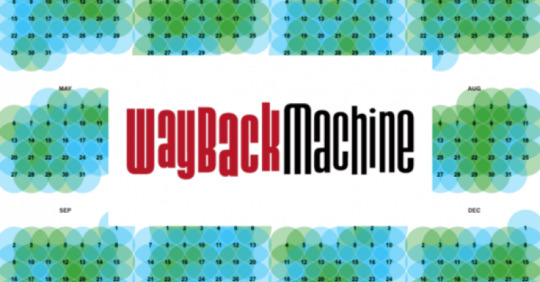
#20yrsago Tech-support generation spends Thanksgiving patching for parents https://web.archive.org/web/20041120052426/http://www.msnbc.msn.com/id/6522314/site/newsweek/
#20yrsago Neal Stephenson’s System of the World concludes the Baroque Trilogy https://memex.craphound.com/2004/11/20/neal-stephensons-system-of-the-world-concludes-the-baroque-trilogy/
#15yrsago Owner of trendy Manhattan restaurant Paradou plumbs new depths of evil bad-bossitude https://gothamist.com/food/restaurant-owners-email-to-staff-belongs-in-tyrant-hall-of-fame
#15yrsago Traffic cameras used to harass and limit movement of peaceful protestors https://www.theguardian.com/uk/2009/oct/25/surveillance-police-number-plate-recognition
#15yrsago Owner of trendy Manhattan restaurant Paradou plumbs new depths of evil bad-bossitude https://gothamist.com/food/restaurant-owners-email-to-staff-belongs-in-tyrant-hall-of-fame
#10yrsago Firefox switches default search from Google to Yahoo https://www.cnet.com/tech/services-and-software/in-major-shift-firefox-to-use-yahoo-search-by-default-in-us/
#10yrsago Blackpool’s Broadway Hotel fines guests £100 for negative review https://www.bbc.co.uk/news/technology-30100973
#10yrsago Hacker, Hoaxer, Whistleblower, Spy: why only an anthropologist can tell the story of Anonymous https://web.archive.org/web/20141122163653/https://www.spectator.co.uk/books/9373852/the-anonymous-ghost-in-the-machine/
#10yrsago Secret history of the poop emoji https://www.fastcompany.com/3037803/the-oral-history-of-the-poop-emoji-or-how-google-brought-poop-to-america
#5yrsago In an age of disappearing prison libraries, jail profiteers provide “free” crapgadget tablets that charge prisoners by the minute to read Project Gutenberg ebooks https://appalachianprisonbookproject.org/2019/11/20/how-much-does-it-cost-to-read-a-free-book-on-a-free-tablet/
#5yrsago DoJ to scrap the Paramount antitrust rule that prohibits movie studios from buying or strong-arming movie theaters https://www.reuters.com/article/us-usa-film-antitrust/justice-department-asks-court-to-scrap-decades-old-paramount-antitrust-decrees-idUSKBN1XS2G0/
#5yrsago When Republicans say “How will you pay for Medicare for All?” Democrats should answer: “Mexico will pay for it” https://theintercept.com/2019/11/20/democratic-debate-budget-deficit/
#5yrsago Twitter censures UK Tory Party for changing its blue-check account name to “FactCheckUK” during the prime ministerial debates https://edition.cnn.com/2019/11/19/world/conservative-party-fact-check-twitter-intl/index.html
#1yrago Larry Summers' inflation scare-talk incinerated climate action https://pluralistic.net/2023/11/20/bloodletting/#inflated-ego
7 notes
·
View notes